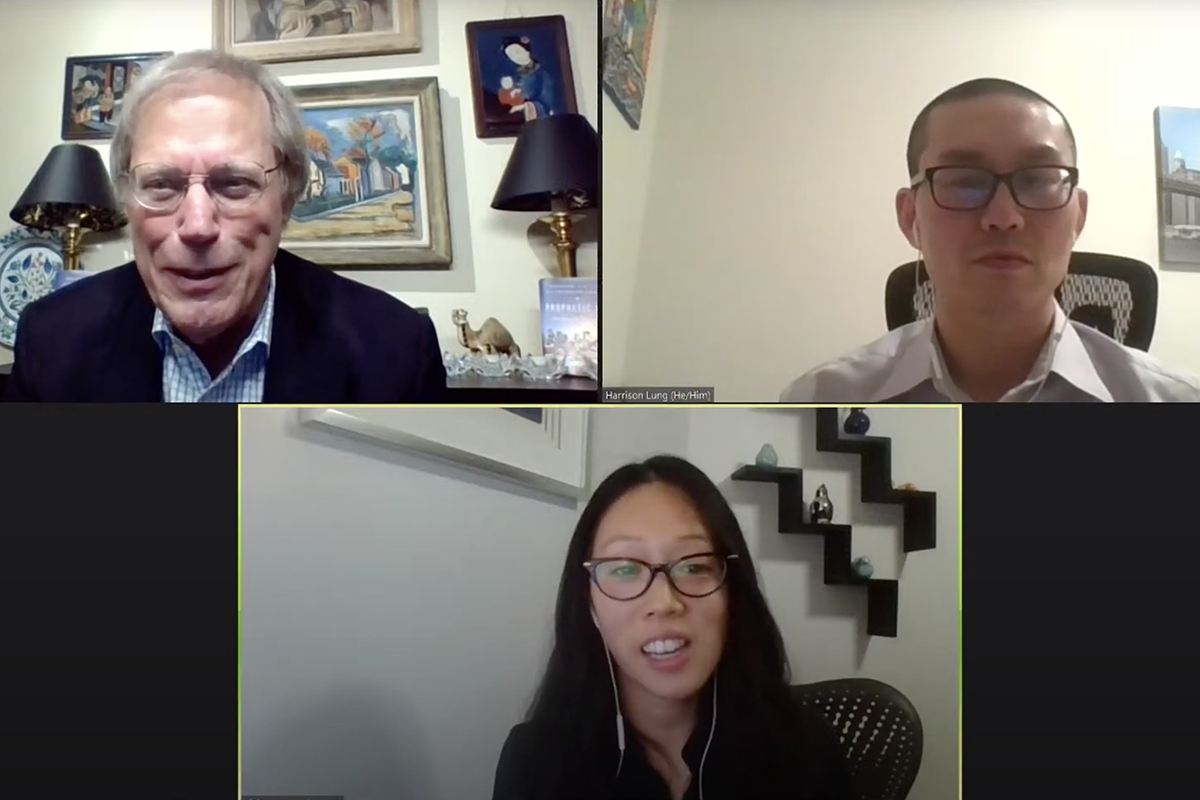
Asia Society at Home
Learn MoreHOUSTON, December 11, 2020 — Asia Society Texas Center concluded 2020 with a webcast examining how the Asian American Pacific Islander community has been impacted by COVID-19, the subject of an August 2020 report from McKinsey & Company titled “COVID-19 and Advancing Asian American Recovery.” In conversation with Kinder Institute for Urban Research Founding Director Dr. Stephen Klineberg, report co-authors Elaine Dang and Harrison Lung discussed what drove the study, key insights and findings, and their main takeaways on the topic.
The goal of the report
Dr. Klineberg opened the conversation by asking Lung and Dang to explain the origins of the report. Lung responded that at the onset of the pandemic, McKinsey wanted to ensure a consistent, research-based understanding of the impacts of COVID-19 on not just the economy but also specific segments of society. He cited several related reports that examined the impacts of COVID-19 on different American communities, highlighting an April report called “COVID-19: Investing in Black Lives and Livelihoods.” Noting that Asian Americans are often underrepresented in media and in the public view, Lung emphasized his desire to “shine a light” on the community to raise awareness and create solutions toward recovery efforts.
The need for disaggregated data on Asian Americans
Dang elaborated on the need for both awareness and targeted solutions by pointing to the breadth and diversity of the AAPI community: though the group makes up only 6 percent of the U.S. population, it spans a myriad of national origins, faiths, languages, education levels, income, and immigration statuses. She said treating Asian Americans as a monolithic group disguises the very real challenges within the group and among subgroups. For instance, according to Dang, the data shows that Asian Americans have the highest in-group income inequality.
This is why Dang is passionate about the need for disaggregated data on the AAPI community. She said that while Asian Americans are overrepresented in the medical field as doctors and nurses, a large percentage of the community works in the hospitality industry for lower wages, perhaps with less education. She noted that many Asian Americans are also small business owners who may not have sufficient access to or support from government programs and services due to immigration status, language barriers, or simply a lack of awareness or familiarity with the system. She said she believes that addressing these different needs and complexities requires to first acknowledge they exist.
Help Us Build a More Inclusive World
Recommendations for pandemic recovery
Lung summed up three key takeaways from the report. First, he again underlined the need for disaggregated data, to provide a more granular view of the way different AAPI subgroups have been affected by the pandemic – whether it is anti-Asian racism impacting businesses, frontline and essential workers facing increased health risk, or multigenerational families with differing accessibility to COVID-19 resources. Secondly, Lung said it is vital to form allyships and partnerships within the AAPI community – as well as outside the community – to combat bias and xenophobia. Finally, he indicated that the unique, non-monolithic nature of the broad AAPI community necessitates tailored programs and policies to serve these subgroups directly.
Dang added that representation is a central part of implementing those policies, as those with lived experience often know the needs of their communities best. She said representation is important at all levels of government, and also in the higher echelons of business and other sectors, to better connect communities to resources – not just economic and financial resources, Dang pointed out, but those that can address the community’s mental, social, and cultural well-being as well.
She encouraged Asian Americans to consider actively participating in what Dr. Klineberg called “the process of building a truly multiethnic society” and spotlighting the needs of their own communities. Dang suggested they could do this by running for office, working closely with elected officials and community leaders, or speaking directly with loved ones about their needs and the resources that are available.
Business and Policy programs are endowed by Huffington Foundation. We give special thanks to Bank of America, Muffet Blake, Anne and Albert Chao, ConocoPhillips, ExxonMobil, Nancy Pollok Guinee, and United Airlines, Presenting Sponsors of Business and Policy programs; Nancy C. Allen, Chinhui Juhn and Eddie Allen, and Leslie and Brad Bucher, Presenting Sponsors of Exhibitions; Dr. Ellen R. Gritz and Milton D. Rosenau, Presenting Sponsors of Performing Arts and Culture; Wells Fargo, Presenting Sponsor of Education & Outreach; and Mitsubishi Corporation (Americas), Presenting Sponsor of the Japan Series. General support of programs and exhibitions is provided by The Brown Foundation, Inc., The Hearst Foundation, Inc., Houston Endowment, Inc., the City of Houston through Houston Arts Alliance, McKinsey & Company, Inc., National Endowment for the Arts, Texas Commission on the Arts, Vinson & Elkins LLP, and Mary Lawrence Porter, as well as Friends of Asia Society.
About Asia Society at Home
We are dedicated to continuing our mission of building cross-cultural understanding and uplifting human connectivity. Using digital tools, we bring you content for all ages and conversations that matter, in order to spark curiosity about Asia and to foster empathy.
About Asia Society Texas Center
With 13 locations throughout the world, Asia Society is the leading educational organization promoting mutual understanding and strengthening partnerships among the peoples, leaders, and institutions of Asia and West. Asia Society Texas Center executes the global mission with a local focus, enriching and engaging the vast diversity of Houston through innovative, relevant programs in arts and culture, business and policy, education, and community outreach.
"asian" - Google News
December 12, 2020 at 02:43AM
https://ift.tt/3gEV14D
Authors of Report on Asian Americans Affected by COVID-19 Discuss Need for Disaggregated Data, Targeted Policies - Asia Society
"asian" - Google News
https://ift.tt/2STmru2
Shoes Man Tutorial
Pos News Update
Meme Update
Korean Entertainment News
Japan News Update

No comments:
Post a Comment